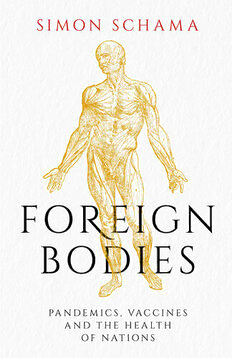
Foreign Bodies: Pandemics, Vaccines, and the Health of Nations PDF
02023·40.921 MB·English
Most books are stored in the elastic cloud where traffic is expensive. For this reason, we have a limit on daily download.
Preview Foreign Bodies: Pandemics, Vaccines, and the Health of Nations
Description:
A vibrant cultural history investigating the tangled and complex history of pandemics and vaccines, by bestselling author and historian Simon SchamaCities and countries engulfed by panic and death, desperate for vaccines but fearful of what inoculation may bring. This is what the world has just gone through with Covid-19. But as Simon Schama shows in his epic history of vulnerable humanity caught between the terror of contagion and the ingenuity of science, it has happened before. Characteristically, Schama’s message is delivered through gripping, page-turning stories set in the eighteenth and nineteenth centuries: smallpox strikes London; cholera hits Paris; plague comes to India. Threading through the scenes of terror, suffering and hope – in hospitals and prisons, palaces, and slums – are an unforgettable cast of characters: a philosopher-playwright burning up with smallpox in a country chateau; a vaccinating doctor paying house calls in Halifax; a woman doctor in south India driving her inoculator-carriage through the stricken streets as dead monkeys drop from the trees. But we are also in the labs when great, life-saving breakthroughs happen, in Paris, Hong Kong, and Mumbai. At the heart of it all is an unsung hero: Waldemar Haffkine, a gun-toting Jewish student in Odesa turned microbiologist at the Pasteur Institute, hailed in England as “the saviour of mankind” for vaccinating millions against cholera and bubonic plague in British India while being cold-shouldered by the medical establishment of the Raj. Creator of the world’s first mass production line of vaccines in Mumbai, he is tragically brought down in an act of shocking injustice.Foreign Bodies crosses borders between east and west, Asia and Europe, the worlds of rich and poor, politics and science. Its thrilling story carries with it the credo of its author on the interconnectedness of humanity and nature; of the powerful and the people. Ultimately, Schama says, as we face the challenges of our times together, “there are no foreigners, only familiars.”
See more
The list of books you might like
Most books are stored in the elastic cloud where traffic is expensive. For this reason, we have a limit on daily download.
